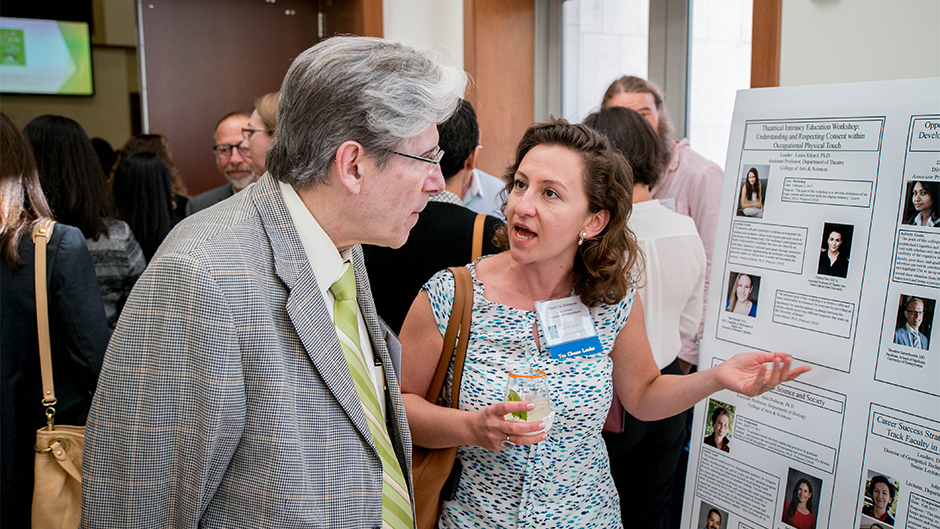“Stop!” several voices called from the audience, unable to contain their angst and discomfort at the scenario unfolding on stage. Though the “interview”—a department chair appraising a tenure candidate—was staged, the insinuations, mixed messages, and inappropriate, bias-laden questioning had hit their mark: People were riled.
Interactive Theatre, a powerful teaching tool, played out as a major and enlightening part of the SEEDS Annual Networking Dinner on March 21 at the Newman Alumni Center. With its “bottom-up” approach, the SEEDS program serves to advance the careers of faculty—especially women and minorities—through mentoring and leadership opportunities; celebrating diversity and inclusion; and eliminating biases based on gender, race, and ethnicity.
As part of the interactive teaching module, attendees first observed, then discussed among themselves the missteps they were observing, and finally they intervened—replacing the actors on stage—to redirect the process.
“Unfortunately, too much of what we’re seeing on stage hits close to home—we still experience this too much in our real world,” one woman commented. Her candor was echoed by others.
President Julio Frenk served as the keynote for the annual event, now in its ninth year, and applauded the role of the SEEDS program. He was joined by Jeffrey Duerk, executive vice president for academic affairs and provost, Lourdes Dieck-Assad, vice president for Hemispheric and Global Affairs, and several deans from the SEEDS Steering Committee.
“SEEDS is a fantastic initiative with a great name—it embodies the whole idea for the culture of belonging,” said Frenk, referring to the university-wide effort to create a climate where “everyone is valued and everyone adds value.”
The president and College of Arts and Sciences Dean Leonidas Bachas, who is on the steering committee, both highlighted progress in the terrain of diversity—including an increase in female faculty from 88 to 112, a 75percent increase in African-American students to 11 percent of the student population, and steps to address concerns of the LGBTQ community. But the president added that “we still have a long way to go still facing many hidden biases and many that are not so hidden in our society.
“We have a lot in our favor—Miami is a city comfortable with its diversity,” Frenk said. “But being comfortable is not enough, we have to continue to invest effort and resources.”
SEEDS Director Villy Kourafalou welcomed guests and highlighted that the initiative has recently broadened its scope and impact, from an initial thrust of supporting women in the sciences, to now promoting diversity at schools, colleges, and units around campus. Seventeen grantees have received $2,500 each to support a range of projects that advance SEEDS goals.
“SEEDS focuses on supporting faculty, yet these programs benefit students and the entire University community,” said Kourafalou, a research professor in the Department of Ocean Sciences at the Rosenstiel School of Marine and Atmospheric Science.
Program Manager Marisol Capellan said that SEEDS will continue to sprout new inclusion and empowerment in the year ahead.
“We plan to collaborate with even more departments, helping faculty from each campus and individual college to advance their career and research initiatives. As a result, we plan to build on our successful efforts of this academic year, to further involve the deans and their staffs, for various planning and projects,” Capellan said. “We remain committed to making UM an even more welcoming institution that hires, prepares and retains women and minorities for faculty and staff advancement.”
Lisa Beal, professor at the Department of Ocean Sciences, with Amy Clement, professor of atmospheric sciences, received a SEEDS grant for a mentoring workshop designed to identify common issues from the perspective of both graduate students and faculty, and provide powerful strategies for improving mentor-mentee relationships.
Miriam Lipsky, senior learning and facilitation specialist in the UM Office of Institutional Culture, was recently awarded a SEEDS “You Choose” Leadership Award and used it to facilitate a workshop, cosponsored by the UM Women’s Commission and the School of Education and Human Development, to explore how social identities influence workplace engagement.
Creative Writing Professor Chantel Acevedo and Osamudia James, vice dean and professor in the Law School, recently used a SEEDS grant to advance the One Book, One U common-book initiative that has offered a series of events based on the Make Your Home Among Strangers novel that explores the first-generation college experience and themes of inclusion, identity, and immigration.
President Frenk suggested that the University, through the SEEDS initiative and other campus efforts to promote inclusion, create metrics to chart progress and, as part of that goal, become an “observatory of belonging.”
SEEDS, administered through the Office of Faculty Affairs, champions mentoring, leadership, peer networking, research initiatives and interdisciplinary faculty career workshops in empowering women and strengthening diversity.
For more information, contact SEEDS Program Manager Capellan at 305-284-2971 or email mcapellan@miami.edu

